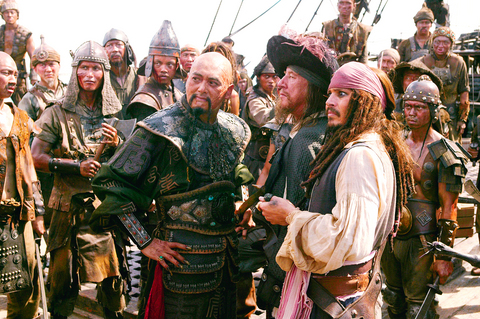Like a weightlifter popping ever more steroids, Hollywood is breaking record after record this summer as its diet of bigger, better and more spectacular sequels pulls in huge audiences all around the world.
Starting with Spider-Man 3 and continuing with Shrek the Third, filmgoers seem unable to resist the old-new offerings from the giants of the film world.
Spidey's web of records included the best ever opening worldwide with a whopping US$381 million on its first weekend. By just its third week in release it had amassed US$750 million worldwide.

PHOTO: COURTESY OF SONY
Shrek the Third meanwhile bagged the biggest opening ever for an animated movie, taking in almost US$122 million with its opening weekend in the US, and blowing past the previous record set by its predecessor in 2004.
The apparently insatiable desire of moviegoers to see new episodes of familiar films has Disney executives salivating with expectation in advance of Pirates of the Caribbean: At World's End, which hits movie theatres last night with another swashbuckling tale about the lovable and eccentric rogue, Captain Jack Sparrow.
Executives are confident that audiences will flock to the movie like they did to its predecessor Pirates of the Caribbean: Dead Man's Chest. That movie, the second in the franchise, was released last summer and quickly became the second most successful film in Hollywood history, earning US$1.065 billion.
Those are stellar figures, especially since many experts had predicted the demise of the blockbuster movie experience in an age of unlimited entertainment possibilities presented by the Internet.
Movie detractors may point out that the record-breaking bonanza is due, at least in part, to the ever-inflating cost of movie tickets. But face it — cinemas couldn't charge US$10 dollars a ticket if people didn't really, really want to see the films on offer.
So what's behind this success, which will probably keep rolling through the summer, with films like Harry Potter and The Order of the Phoenix, Live Free or Die Hard, Fantastic Four: Rise of the Silver Surfer and Evan Almighty, the sequel to 2003's Bruce Almighty?
Simply put, it seems that Hollywood has cracked its own Da Vinci Code curse, hitting upon the secret of the sequel.
Traditionally franchise movies declined the longer the series progressed as the production team got bored, the original actors left and extraneous new characters and gimmicks detracted from the purity of the original viewing experience.
The new sequels however are often made together with the originals — a strategy pioneered by The Lord of the Rings and continued with Pirates.
"Continuity is certainly a plus when it comes to series," said Brandon Grey, founder of Box Office Mojo. "Sequels should have a similar feel as their predecessors and should be in the same universe."
Even when such marathons of film-making are impossible, studios ensure that they sign key personnel to sequel options, and focus sharply on keeping the original components intact to appeal to as large an audience as possible.
The approach is certainly commercially attractive, if not artistically daring.
"You know the characters and since you enjoyed the previous movies, of course you want to go again," said Lauren Rodriguez, a Los Angeles high school student who says she won't miss a single one of the big franchise movies this summer. "I know they're not sophisticated. But they're fun. And that's what summer's all about."

April 28 to May 4 During the Japanese colonial era, a city’s “first” high school typically served Japanese students, while Taiwanese attended the “second” high school. Only in Taichung was this reversed. That’s because when Taichung First High School opened its doors on May 1, 1915 to serve Taiwanese students who were previously barred from secondary education, it was the only high school in town. Former principal Hideo Azukisawa threatened to quit when the government in 1922 attempted to transfer the “first” designation to a new local high school for Japanese students, leading to this unusual situation. Prior to the Taichung First

The Ministry of Education last month proposed a nationwide ban on mobile devices in schools, aiming to curb concerns over student phone addiction. Under the revised regulation, which will take effect in August, teachers and schools will be required to collect mobile devices — including phones, laptops and wearables devices — for safekeeping during school hours, unless they are being used for educational purposes. For Chang Fong-ching (張鳳琴), the ban will have a positive impact. “It’s a good move,” says the professor in the department of

On April 17, Chinese Nationalist Party (KMT) Chairman Eric Chu (朱立倫) launched a bold campaign to revive and revitalize the KMT base by calling for an impromptu rally at the Taipei prosecutor’s offices to protest recent arrests of KMT recall campaigners over allegations of forgery and fraud involving signatures of dead voters. The protest had no time to apply for permits and was illegal, but that played into the sense of opposition grievance at alleged weaponization of the judiciary by the Democratic Progressive Party (DPP) to “annihilate” the opposition parties. Blamed for faltering recall campaigns and faced with a KMT chair

Article 2 of the Additional Articles of the Constitution of the Republic of China (中華民國憲法增修條文) stipulates that upon a vote of no confidence in the premier, the president can dissolve the legislature within 10 days. If the legislature is dissolved, a new legislative election must be held within 60 days, and the legislators’ terms will then be reckoned from that election. Two weeks ago Taipei Mayor Chiang Wan-an (蔣萬安) of the Chinese Nationalist Party (KMT) proposed that the legislature hold a vote of no confidence in the premier and dare the president to dissolve the legislature. The legislature is currently controlled